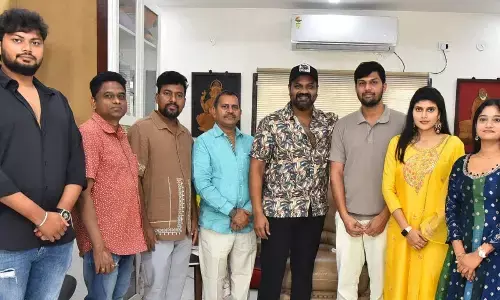Author Speak : Literature is not for entertainment

Aruna Ravikumar
I know who the killers are : I shall turn the blame On the ocean for a while�.It's alright Carcasses do not demand explanations; It doesn't matter, though: The flag doesn't shed tears (An extract from "koyya gurram" (the wooden Horse by Nagnamuni)
The woodenness and insensitivity of an establishment indifferent to the devastation caused by the insensitive handling of a natural calamity, the anguish and pain of life being snuffed out by nature's fury and administrative inefficiency and finally the philosophical yet optimistic end where the poet talks about the emergence of new values, dreams and convictions make it one of the most poignant, long poem with a social consciousness in the annals of Telugu literature. This magnum opus by poet, writer and crusader of social movements post independence, Nagnamuni on the Divi Seema Cyclone in 1977 is a comment on the social order that seems timeless viewed against the backdrop of administrative apathy that continues several decades later. The allegory of the "Wooden horse" that gives the child the feeling that he is going somewhere without really doing so, is an indictment of the establishment which merely placates. Translated into Russian and nine other languages, the work has sparked off several essays, debates and books analysing it, giving it a timeless significance and an enduring acceptance.
Manepalli Hrushi Keshava Rao known popularly by his pen name Nagnamuni hails from Tenali, but grew up in Machilipatnam, his mother's hometown and shifted to Hyderabad where he completed his graduation and has been living ever since. His father Manepalli Sangameshwara Kavi was an eminent poet and ardent admirer of Mahatma Gandhi who wrote a book on him called "Paramjyothi".
Nagnamuni, however, was a reluctant poet who accompanied his friend to a free verse poet's gathering (Kavi sammelanam) where all those who attended had to read out a poem. "I accompanied him like the best man (thodu pellikoduku) at a wedding. Left with no choice, I penned a few lines that I read out which were very well received. I then started writing under the pen names such as Sudha,Vanamali and Keshava Rao initially before arriving at Nagnamuni (The sage who spoke the truth) which stuck," says the poet who became a trendsetter in more ways than one for all his reluctance. His first poem "Saundaryapu Swagataalu" published in the Telugu daily "Swatantra" in 1957 edited by Gora Sastry earned him instant recognition. Short stories in the magazines Bharati and Yuva at the behest of Tripuraneni Gopichand earned him good reviews and established him as a poet and short story writer of repute.

Nagnamuni's first compilation of poems "Udayinchani Udayaalu" which roughly translated means "mornings without a dawn' had a title which was a contradiction in itself, but received rave reviews. Curious to know how the reviewer would respond to criticism from certain intellectuals about his work, Nagnamuni wrote a letter under the name of "Neelakanta Sastry" rubbishing the praise showered on the book in chaste literary Telugu. The reviewer KV Reddy sent him a reply enunciating his stand and all was forgotten until Nagmanuni told him almost three decades later that he had denounced his own book writing as an ordinary reader. But why would a writer want to write something against his own work?
Nagnamuni laughs aloud before explaining, "I had read somewhere that Jawaharlal Nehru criticised his own work writing under the name "Chanakya" to get answers to questions that may arise in the minds of readers. I was inspired by this mode of self-criticism that resulted in different perspectives". An experiment with free verse for the first time came about through his poem "Nenekkina Taxi number" which had a story embedded in the poetic narration a la Eliot. A job in the state Legislative Assembly resulted in Nagnamuni observing elected representatives from close quarters.
He found that most of them were merely power seekers disconnected with the aspirations of the people". Although our country was liberated our politicians seemed to remain in "British Times" in their thinking and approach" was his feeling at that point. The simmering resentment and the gap between the implementation of ideas and the expectations of the people resulted in an uneasy calm of discontent that had no expression or outlet. This was Nagnamuni's chance to try out yet another experiment and bring to the fore a new group of rebel poets whose views and style were recognised as a decisive break in the history of modern Telugu Literature.
Five other poets who all assumed revolutionary pen names like Nikhileshwar, Jwalamukhi etc became the famous six "Digambara Kavulu" (Naked poets) where the allusion to the naked part was to their poetry which ruthlessly attacked the system. Looking at an issue in its stark reality these poets took on the system giving vent to their anger in strong language and irreverent tone that brought them great criticism from puritans and intellectuals alike. These poets who became the pioneers of a movement were showered with the choicest epithets and descriptions like obscene, violent and "Rowdy poets". "Our poetry had dissent as the central theme and we used our words as vehicles of our anger.
We now had a distinct identity as poets and our mission was to reconstruct society which was at an abysmal low. Shock is a mild word as various cross sections of society were shattered by our work," says Nagnamuni. The work of these poets was released in three volumes where the book releases were held after midnight mostly on the roadside in stark contrast to closed door literary meetings attended by celebrities. A rickshaw puller, a hotel cleaner and finally a beggar woman released the different volumes in Hyderabad, Vijayawada and Vizag, with an audience of about 500 hundred people despite the odd hour.
Recalls Nagnamuni, "The "Digambara movement" became a major one soon going out of the hands of its creators and into the people. Many research scholars took up our works as subjects and we were the inspiration for many later day movements". Such was their popularity at the peak of the movement that people had a matinee show stopped to meet the writers who had gone to watch the movie at a theatre in Vizag. The great revolutionary poet Sri Sri was a fan of the Digambara poets and even translated some of their poetry into English.
Although Nagnamuni was one of the founder members of the Revolutionary Poets Movement (Virasam), he resigned from it in 1979. Arrested and detained for 36 hours during the emergency, he was dismissed from service and jobless for 18 months before being reinstated with full salary by the Janata party government that came to power in 1977. This proved a blessing in disguise as he wrote a play based on the novel Malapalli by Unnava Lakshminarayana on a request by the famous theatre personality AR Krishna.
The play was staged continuously for 100 days and brought him the first film based on his story called "Maro Charitra" directed by K Balachander. Although he wrote stories for successful films like "MLA Edukondalu" and "Trishoolam" he did not give in to the temptation of working for the film industry going back to his job where he remained till he retired in 1998. Several of his works like "Viloma kathalu", "Jammi chettu", "Toorpu Gaali" and others were all reflections of his concern for society and penchant at looking at issues from a philosophical perspective.
His latest book "Akasa Devara" is a compilation of stories set in the backdrop of exploitation by politicians and crooks and "Advaita Charitam" which will be released shortly is another work embodying his concern and desire to change the state of things in contemporary society. Not one to care about awards and rewards Nagnamuni is happy to be chosen for the Tanikella Bharani award as it is a honour by a multifaceted genius whose recognition is an honour that will be cherished.
Traversing a remarkable path from a shy introvert and reluctant poet to that of a fire spitting protagonist of a movement that will remain a milestone in Telugu literature, Nagnamuni believes that literature is not for entertainment. He says "A poet has to lead the way, question values and reconstruct society. The power of his words cannot be undermined".











